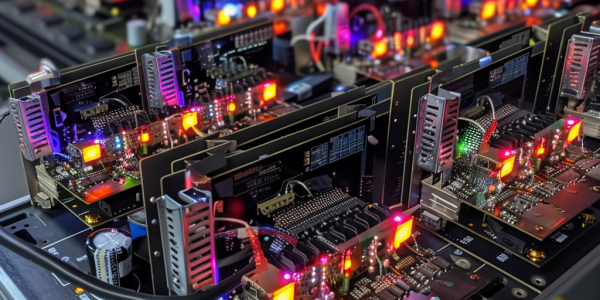DOE Allocates Supercomputer Resources for Groundbreaking Cosmic Ray Research
The U.S. Department of Energy has committed significant supercomputer resources to advance computational science, including a groundbreaking project by Drummond Fielding at Cornell University. His research on cosmic ray transport in interstellar turbulence, utilizing the Frontier supercomputer, aims to uncover vital insights into galaxy formation and black hole growth. This initiative underscores the importance of high-performance computing in modern astrophysics and promises to reshape our understanding of the universe.
Frontier Supercomputer Executes Largest Universe Simulation, Advancing Astrophysics
The Frontier supercomputer at Oak Ridge National Laboratory has executed the largest simulation of the universe, enhancing our understanding of cosmological hydrodynamics. This groundbreaking achievement, led by a team from Argonne National Laboratory, showcases the power of high-performance computing in astrophysics, pushing the boundaries of our knowledge about the universe’s evolution and structure formation.
Breakthrough in Nuclear Fission Research Reveals Insights on Neck Rupture Phenomenon
Recent research by the University of Washington and Los Alamos National Laboratory has advanced our understanding of nuclear fission, specifically the neck rupture phenomenon. Utilizing the Summit supercomputer, the team conducted the first fully microscopic simulation of this process, offering new insights into the dynamics of fission and the role of scission neutrons. Published in Physical Review Letters, these findings challenge existing theories and highlight the importance of computational physics in exploring nuclear processes, with implications for nuclear medicine and energy generation.
Elon Musk Threatens to Ban Apple Devices at His Companies Over OpenAI Partnership
Elon Musk threatens to ban Apple devices at his companies due to concerns over Apple’s partnership with OpenAI. Musk questions the security of user data with OpenAI integration into Apple’s operating systems, prompting him to require visitors to check their Apple devices at the door. This move reflects Musk’s skepticism towards AI technology and data security, amidst a legal dispute with OpenAI over prioritizing profits over humanity.
YouTuber bitluni wows tech world with 256-core RISC-V megacluster creation
Discover how YouTuber bitluni wowed the tech world with his 256-core RISC-V megacluster, showcasing the intricate process of building a miniature supercomputer from scratch. From innovative design combining 16 superclusters to addressing technical challenges, bitluni’s creation is a testament to DIY innovation in the tech industry.
Study Predicts Earth’s Future to be Uninhabitable for Mammals in 250 Million Years
A recent study published in Nature Geoscience predicts the eventual demise of mammalian life on Earth in 250 million years. Earth’s tectonic plates are projected to merge, releasing high levels of CO2 and raising temperatures to 40-50 degrees Celsius, making it impossible for terrestrial life to survive. This underscores the fragility of our planet’s ecosystem and the challenges future generations may face.
Impending ‘Triple Whammy’ Extinction Event Predicted to Wipe Out All Life on Earth
A ‘triple whammy’ extinction event is predicted to eventually wipe out all life on Earth, comparing to the most recent mass extinction event. Dr. Alexander Farnsworth from the University of Bristol forecasts extreme heat, aridity, and uninhabitability in Earth’s future, leading to widespread extinction. However, this cataclysmic event is estimated to occur in approximately 250 million years, sparing current generations from its dire consequences, unless accelerated by human-induced climate change.
Old Supercomputer for Sale in Wyoming
An old supercomputer, the Cheyenne Supercomputer, is currently up for sale in Wyoming. This decommissioned supercomputer boasts impressive specs, featuring a Silicon Graphics ICE XA system with 8,064 processors and 313,344 GB of memory. Despite being surpassed by newer models, it remains a formidable machine for many applications. With a current bid just over $40,000, interested buyers have until May 3rd to make a move.
Cerebras Systems Announces Third-Generation Wafer Scale Engine (WSE-3) Processors
Cerebras Systems announces its third-generation Wafer Scale Engine (WSE-3) processors, achieving a 2X performance improvement with a shift to a 5 nanometer process. The WSE-3 boasts an eight-wide FP16 SIMD math unit and 44 GB on-chip SRAM capacity, marking a significant advancement in supercomputing technology.









